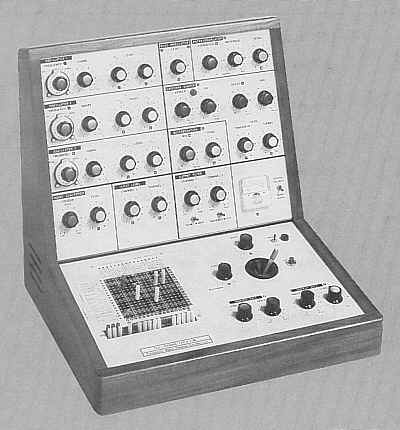The Synthi VCS3 (The Putney) |
|
| The VCS3 had its roots in 1968 and was conceived by the trio of David Cockerell, Tristram Cary and Peter Zinovieff. Described as the first commercially available 'portable music synthesizer' it has proven to be one of the most enduring of instruments too. VCS3's are still available to special order even today! |  |
| The EMS Method...
Whilst the devotees of Moog systems battled with their cumbersome and limiting patchcords, the owner of an EMS Synthi had the pleasure of virtually limitless patching combinations at their fingertips in the shape of a 16x16 pin matrix. The panels of a busy Moog modular often became totally obscured with patchcords, making adjustments awkward or impossible! Not so with the Synthi, the neat and ultimately more flexible approach leant itself to the creation of complex sound effects without the tangles! |
|
| Specifications: | |
| Osc. 1 | Range: 0.5Hz to 20kHz with sine and saw |
| Osc. 2 | Range: 0.5Hz to 20kHz with square and triangle (variable P/W and ramp) |
| Osc. 3 | Range: 0.025 Hz to 500Hz with square and triangle as per above |
| Noise | White and variable colour noise |
| Filter/Oscillator | Range: 5 Hz to 15 kHz 18 dB /octave low-pass with variable resonance to sinewave self oscillation |
| Ring-modulator | Transformerless IC design with up to 60dB input rejection |
| Envelope Shaper | 'A programmed variable gain amplifier of
trapezium format with analogous voltage output' !
Attack: 2 mS to 1s |
| On: 0 to 21.5s | |
| Decay: 3mS to 15s | |
| Off: 10mS to 5s + recycle inhibit | |
| Decay time is VC controllable via the patchboard (column 'L') | |
| Trigger modes | Via + 4V gate from keyboard |
| Manually with the 'Attack' button | |
| External signal via level threshold detector | |
| Self trigger in recycle mode | |
| Reverb | Dual spring unit with delays of 25mS and 30mS with a max reverb of around 2s (Wet/dry mix controlled via patchboard column 'M') |
| Joystick | X and Y functions available on rows 15/16 |
| Meter | For CV or signal monitoring (also used with the KS sequencer for memory monitoring) |
| Inputs | 2 x 6.25mm jack sockets for mic level |
| 2 x 6.25mm jack sockets for high level (2.5V into 50Kohms) | |
| Outputs | 2 x 6.25mm jack sockets for post VCA signal (2.5V into 600ohms) |
| 2 x 6.25mm jack sockets for control etc (pre VCAs) | |
| 1 x 6.25mm stereo jack socket for Headphones | |
| 1 x 6.25mm stereo jack socket for oscilloscope etc (column 'B' on pin matrix) | |
| Interconnections | EMS Synthi's use 0.32V/octave which often causes confusion
as to its compatibility with 1V/octave synthesizers. However it is only
necessary to scale down the control voltage by about a factor of three
using a potential divider.
Connections the other way round are a little trickier, but still quite feasible. The MK II instrument features a Prestopatch socket which gives access to all the matrix inputs and outputs, therefore a non-invasive means to provide remote control. |
| The unit measures 438 x 444 x 419 mm and weighs approximately 10.2 kilos | |